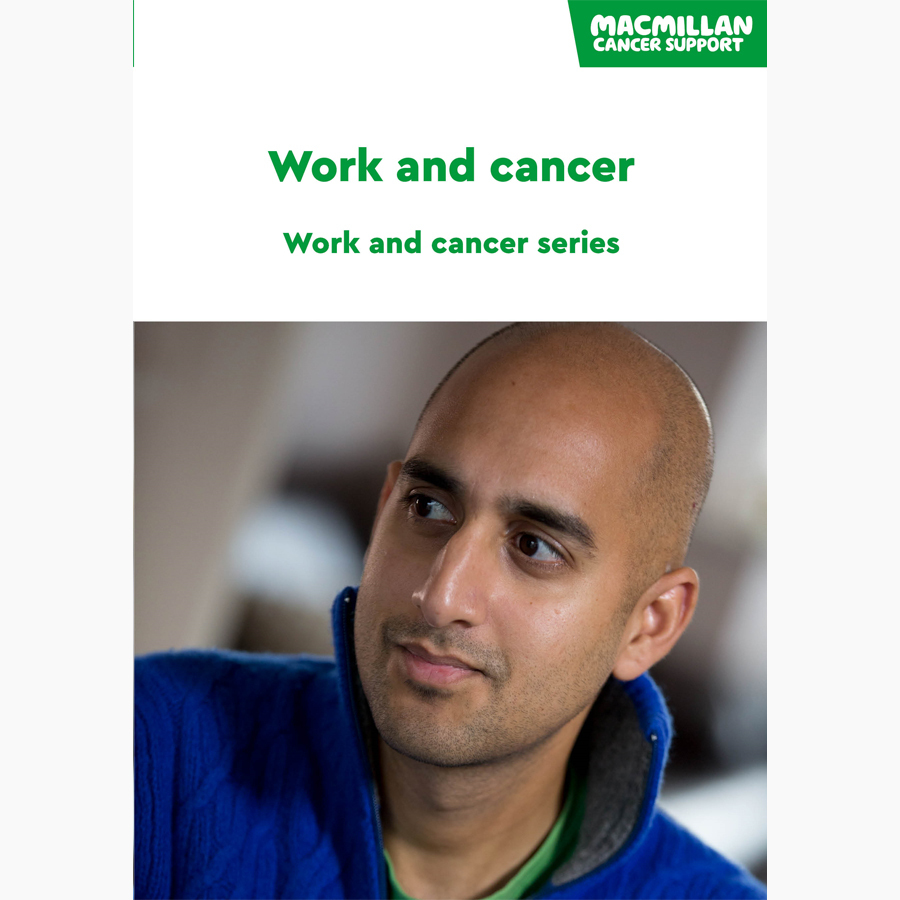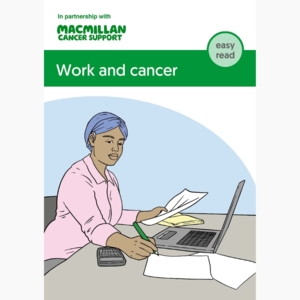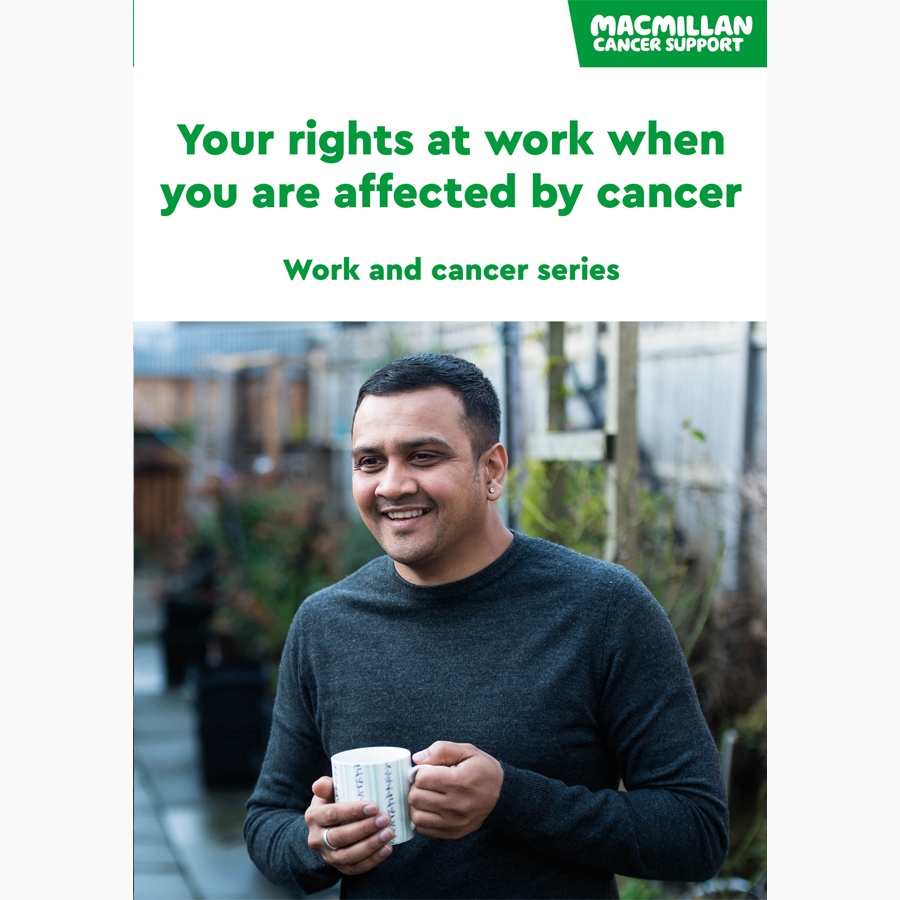Work and cancer
On this page
-
How will cancer affect my work life?
-
How will cancer affect me if I am self-employed?
-
What are my rights at work?
-
Do I have to tell my employer I have cancer?
-
What kind of support can I have from my employer?
-
How do I make decisions about work if I have cancer?
-
Will I need time off work?
-
Am I entitled to sick pay if I have cancer?
-
What benefits could I be entitled to?
-
How will cancer affect my feelings about work?
-
About our information
-
How we can help
How will cancer affect my work life?
Cancer can cause changes in many areas of your life. One of these may be your work life. How cancer affects your work can depend on different things, such as:
- the type of cancer and its stage
- your treatment and its side effects
- your finances
- any practical support you have.
You may need time off work to have tests, appointments and treatments. You may also need time to cope with your feelings. For example, if you feel anxious, shocked or upset.
Some people stop working during cancer treatment and for a while after until they feel ready to go back. Others carry on working, perhaps with reduced hours or changes to their job.
We cannot cover every situation, so it is important to know who to contact at your workplace for the right advice.
View the video without BSL interpreter on our YouTube Channel.
Related pages
Booklets and resources
How will cancer affect me if I am self-employed?
You may need to make decisions about how to keep your business going during and after cancer treatment.
If you need to reduce your working hours, the cash flow of your business could be affected. You may be worried that you do not have cash to pay your employees or repay a business loan.
Being self-employed may mean you work by yourself. It may mean that you can work in a more flexible way and set your own pace.
What are my rights at work?
If you have cancer, the law considers this a disability. This means you cannot be treated less favourably than people who do not have cancer because you have cancer.
You also cannot be treated less favourably for reasons connected to the cancer. That would be discrimination.
Legal protection against discrimination
There are laws that protect you from being discriminated against at work because of cancer. If you live in:
- England, Scotland or Wales, the Equality Act 2010 protects you
- Northern Ireland, the Disability Discrimination Act 1995 protects you.
These laws do not just protect employees. They also protect people who are:
- classified as workers – for example, people who work for an agency
- applying for jobs
- self-employed – this is on a case-by-case basis.
The legal protection against discrimination does not end when your cancer treatment finishes. If you have been diagnosed with cancer in the past, you will continue to have legal protection against discrimination even if you no longer have cancer.
You will also have protection if you move to another employer. We have more information about finding a new job.
We have more information about cancer and employment rights if you are employed or self-employed.
Carers are also protected from some types of discrimination. We have more information about cancer and employment rights as a carer.
Related pages
Booklets and resources
Do I have to tell my employer I have cancer?
You do not have to tell your employer you have cancer. But unless they know or should reasonably know, they do not have to make reasonable adjustments. These are changes to the workplace or your job that allow you to keep working or return to work.
You may be behaving differently because of the cancer and not have told your employer you have cancer. It is reasonable for them to check whether your behaviour is connected to a disability. They can then ask how they might be able to support you.
Talking to your employer about the cancer
If you want to, it can be a good idea to tell your work about the cancer and your treatment. It is your choice what you share. You can ask the people you tell at your work to keep things confidential. This means they will not tell anyone what you have told them.
You can speak to your manager or human resources (HR) department if your employer has one. You can tell your manager or HR department about how the cancer or treatment may affect your work. Knowing this can help your manager or employer support you.
If your workplace has an occupational health adviser, you could ask your manager to refer you to them. Your occupational health adviser will keep everything confidential if you ask them to.
Related pages
What kind of support can I have from my employer?
There are different ways your employer can support you at work during treatment or when you return to work. Most employers understand that it is a stressful time and try to be helpful.
Employers may make changes to your workplace or working arrangements that allow you to keep working or return to work. They may change certain parts of your job so you can stay at work. This is called a reasonable adjustment.
There are also other ways your employer may be able to support you. They can tell you:
- about different policies
- whether there is an occupational health service or an employee assistance programme (EAP)
- about useful organisations that could help you.
It can be helpful to have regular meetings with your manager. You can talk about how to manage any problems, or other changes they can make to help you.
Your employer can access Macmillan at Work. It offers training and resources for employers, to help them better support employees living with or affected by cancer.
Access to Work
Access to Work is a government scheme. It offers grants and advice to help employees with a disability or health condition keep working. You can contact the scheme either as an employer or employee.
Examples of what the scheme may pay for include:
- special aids and equipment you need in the workplace
- travel to work if you cannot use public transport
- a support worker to help you in the workplace.
Visit the Access to Work website for more information about the scheme in England, Scotland and Wales.
Visit the NI Direct website for more information about the scheme in Northern Ireland.
Related pages
How do I make decisions about work if I have cancer?
You may need to make some decisions about work. Important things to think about are:
- your financial situation
- how treatment may affect you.
You can talk to:
- Your cancer doctor, specialist nurse or other healthcare professionals about how treatment might affect your work. They can give you information and tell you what to expect. Let them know what your job involves so you can talk about any difficulties.
- Your employer about what reasonable adjustments could be put in place if you want to keep working or return to work during or following treatment.
- Your partner, family or friends.
Will I need time off work?
You may need to take time off for appointments and treatment. You do not have a legal right to paid time off for things like medical appointments unless your employment contract specifically states this. But if you talk to your employer as soon as possible, you can both agree on what to do.
Your manager or HR manager can give you information about the sickness policy and other options. They can explain if different types of leave are paid or unpaid, and what you are entitled to.
Questions about work issues and time off work
Related pages
Am I entitled to sick pay if I have cancer?
Most people are entitled to sick pay. There are 2 types:
- Occupational or company sick pay – this is your employer’s own sick pay scheme. Check your contract to find out what you are entitled to. It may be more generous than Statutory Sick Pay, or be paid on top of it.
- Statutory Sick Pay (SSP) – if you are not entitled to anything under a company scheme, your employer should still pay you SSP if you are eligible.
We have more information on cancer and sick pay entitlement.
What benefits could I be entitled to?
In addition to Statutory Sick Pay (SSP) and Occupational or company sick pay (above), you may be able get other types of financial help if cancer affects your ability to work:
- Employment and Support Allowance (ESA) is for people under State Pension age who have an illness or disability that affects how much they can work.
- Universal Credit (UC) is a benefit for people under State Pension age who are either not working – for example, because of an illness or caring responsibilities or on a low income.
- Personal Independence Payment (PIP) is a benefit for people aged 16 to State Pension age. It is for people who have problems with daily living or moving around. You must have had these problems for 3 months and expect them to last for at least 9 months. This is unless you are terminally ill.
Self-employed
If you are self-employed, there are a number of benefits you may be able to get:
- Universal Credit
- Personal Independence Payment (PIP).
You can call our money advisors on 0808 808 00 00 for free. They are trained to help you to claim any benefits you may be eligible for.
Other forms of financial support
There are some other ways you may be able to get help with money:
- Loans and grants — if you need financial help, there are many grants and loans available from local and national organisations.
- Insurance — you, or your partner if you have one, may have insurance policies that will pay out because of your situation.
- Pension lump sum — if you have a private pension, you may be able to take some of this money out early.
- Break from payments — your insurer or financial adviser can give you advice about any life insurance policies or pension plans you have. You may be able to take a break from payments.
How will cancer affect my feelings about work?
Living with cancer may change the way you feel about work. You may feel:
- you have lost the sense of normality and independence work gives you
- angry that you cannot be at work as usual
- worried about your colleagues’ reactions
- guilty, if others are taking on some of your work
- frustrated because things you found easy are now more difficult
- less confident in your ability to do your job well
- out of touch with your work colleagues.
Talking about your feelings can often help. You might worry that asking for help makes you a burden. But people are usually pleased to help and support you.
It can be difficult to know who to talk to and what to say. It is important to speak to someone you feel comfortable with and trust.
Booklets and resources
About our information
-
References
Below is a sample of the sources used in our work and cancer information. If you would like more information about the sources we use, please contact us at cancerinformationteam@macmillan.org.uk
Citizens Advice www.citizensadvice.org.uk (accessed May 2022).
GOV.UK www.gov.uk (accessed May 2022).
NI Direct www.nidirect.gov.uk (accessed May 2022).
-
Reviewers
This information has been written, revised and edited by Macmillan Cancer Support’s Cancer Information Development team. It has been approved by Michelle Rouse Griffiths, Professional Development and Knowledge Lead, Macmillan Cancer Support and Liz Egan, formerly with Macmillan’s Work and cancer team.
Our cancer information has been awarded the PIF TICK. Created by the Patient Information Forum, this quality mark shows we meet PIF’s 10 criteria for trustworthy health information.
The language we use
We want everyone affected by cancer to feel our information is written for them.
We want our information to be as clear as possible. To do this, we try to:
- use plain English
- explain medical words
- use short sentences
- use illustrations to explain text
- structure the information clearly
- make sure important points are clear.
We use gender-inclusive language and talk to our readers as ‘you’ so that everyone feels included. Where clinically necessary we use the terms ‘men’ and ‘women’ or ‘male’ and ‘female’. For example, we do so when talking about parts of the body or mentioning statistics or research about who is affected.
You can read more about how we produce our information here.
Date reviewed

Our cancer information meets the PIF TICK quality mark.
This means it is easy to use, up-to-date and based on the latest evidence. Learn more about how we produce our information.







